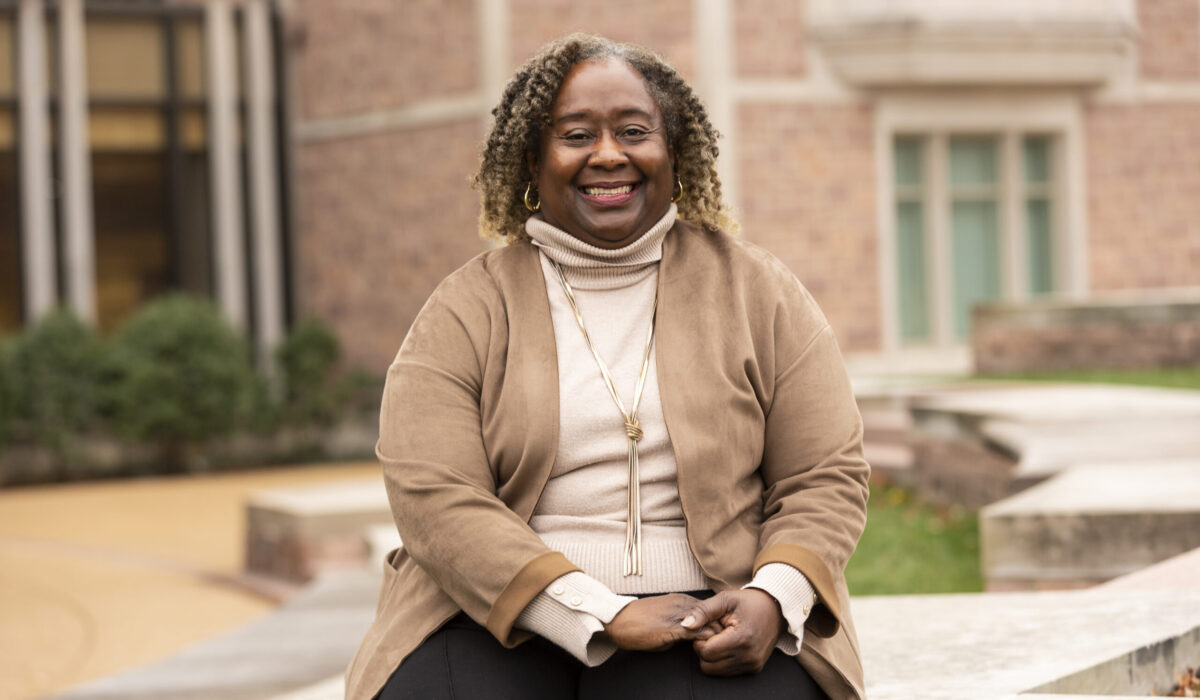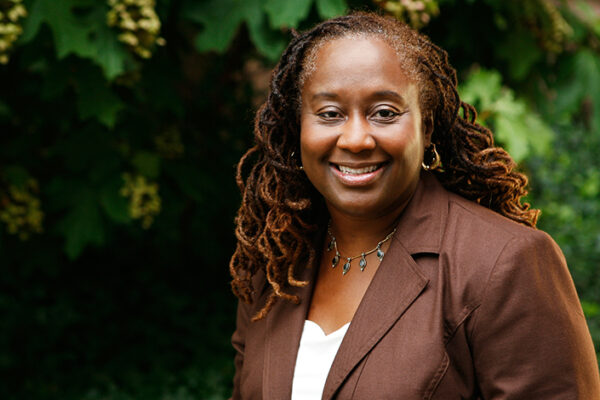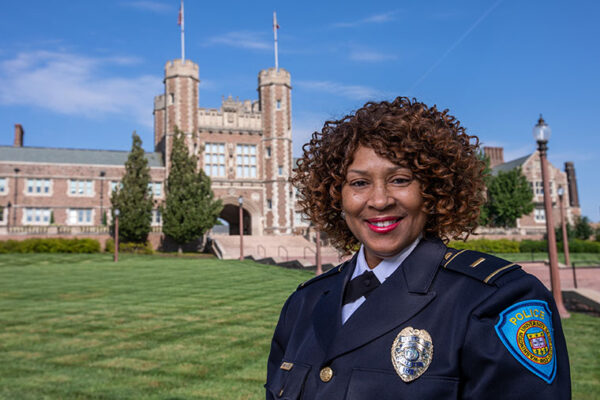Vetta Sanders Thompson has spent much of her career thinking about the health and well-being of diverse communities.
“I love talking with people in the community,” said Sanders Thompson, the E. Desmond Lee Professor of Racial and Ethnic Diversity at the Brown School at Washington University in St. Louis. “I like interacting with the community and assisting where I can, particularly in the area of mental health and health disparities, helping to educate people on ways to prevent some of those health issues from emerging.”
And assist she has. Sanders Thompson leads the Brown School’s Equity, Diversity and Inclusion Committee, co-directs the Center for Community Health Partnership and Research at the Institute for Public Health, and this summer was named the inaugural associate director of diversity, equity and inclusion at Siteman Cancer Center at Barnes-Jewish Hospital and Washington University School of Medicine.
Originally from Birmingham, Ala., Sanders Thompson developed an interest in racial identity and discrimination early in her life.
“I sometimes see myself as a child of the ’60s,” she said. “I entered school in that era. Growing up, I attended predominantly white schools. I got a good education, but I also experienced the challenges that type of environment brings to a young person. It influenced my decision to study psychology as an undergraduate.”
“I am one of five girls,” she said. “Most people at the time I grew up were parented to be traditional. And in hindsight, we were not. My father really valued us feeling competent and able to take care of ourselves.
“We were always brought up to be very proud of who we were and to never feel less than, even at the height of racial tensions. So when I went into a predominantly white school, I sometimes say I didn’t have enough sense to be afraid. I remember the first day. My father walked me to my class and I was wondering, ‘Why is he walking me to my class?’ And now I realize why he walked me to my class. To make sure I got there safely. But after a few weeks, he didn’t do that. And I was on my own. And I came to understand a little bit more about some of my parents’ concerns about me taking that step.”
After graduating magna cum laude from Harvard University in 1981, Sanders Thompson went on to earn her master’s and doctorate degrees in psychology from Duke University.
She began her career in the psychology department at the University of Missouri-St. Louis, where she also worked in the Community Psychological Clinic and collaborated with faculty in the Center for Trauma Recovery. Then, she spent four years at Saint Louis University and ultimately joined the Brown School faculty in 2008.
“I became involved in public health because my work as a psychologist was around mental health and better understanding of the use of mental health services in communities that are typically marginalized and tend to carry stigma based on their racial ethnic identity,” Sanders Thompson said.
“I spent the early part of my career focused on understanding the factors that contributed to concerns about using mental health services and the stigma around a mental health diagnosis and treatment. I was also doing a lot of community education around mental health and mental health treatment options.”
Much of her early research work was also focused on racial identity and racial socialization and how these impacted the mental health status of African Americans and levels of distress in coping with issues such as discrimination.
“Those things, interestingly enough, carried over into my public health research when I started at Saint Louis University,” she said. “My focus was on colorectal cancer and HPV (human papillomavirus) vaccination. It was fascinating to see how many of those issues and topics cross over.”
Sanders Thompson’s research on cancer disparities began as she realized that colorectal cancer had a higher mortality rate among Black people, but was not studied as much as other cancers. A series of focus groups suggested the ability or willingness to undergo screenings was lower due to a lack of knowledge of the disease; screening options; and screening costs, given lower levels of insurance and primary care access.
She worked to modify educational materials and participated in programming to improve cancer screening and acceptance of screenings and vaccination, including HPV vaccination.
Her goal is to empower members of the community to improve their health and well-being through education and opportunities for action.
“Throughout her career, Dr. Vetta Sanders Thompson has made it her mission to empower members of the African American community to improve their health and well-being,” said Tonya Edmond, interim co-dean of the Brown School. “She has done this through her outstanding and inspiring service as a researcher, educator and civic leader. She is an incredibly effective advocate and champion for racial equity, who has contributed substantially to improving health outcomes across the St. Louis region.
“One of the key drivers of the impact she has is her commitment to developing and sustaining meaningful relationships that foster authentic community-based collaborations that center the voices of those most impacted. She is truly one of our most gifted and treasured faculty leaders.”
At the Brown School, Sanders Thompson teaches courses on human diversity, disparities and mental health.
She also teaches a course called “The Business of Us All” with Carol Camp Yeakey, the Marshall S. Snow Professor in Arts & Sciences. The interdisciplinary course focuses on factors that drive inequity and potential solutions to inequity.
The best part of her job?
“I’m always up for an early-morning cup coffee and a conversation and just tossing around ideas,” Sanders Thompson said. “That’s my favorite thing to do. I love talking about interesting research, asking questions, making suggestions. I love interacting with colleagues and students from around the university.”
Sanders-Thompson’s affiliation with Siteman began before she joined the university, when she worked with Siteman’s Program for the Elimination of Cancer Disparities.
In her current role at Siteman, Sanders Thompson will coordinate her efforts with the School of Medicine’s Office of Diversity, Equity and Inclusion to advance shared goals related to diversity, equity and inclusion initiatives.
“As Siteman’s inaugural associate director of diversity, equity and inclusion, Dr. Thompson has already done an excellent job of leading our efforts to enhance and expand diversity within our leadership team, research workforce and advisory boards,” said Timothy J. Eberlein, MD, director of Siteman Cancer Center, the Spencer T. and Ann W. Olin Distinguished Professor and senior associate dean for cancer programs at the School of Medicine and BJC HealthCare.
“She has continued to serve in her multiple leadership roles at Siteman,” Eberlein said. “In addition, she remains an active member of the institution’s Community Outreach and Engagement leadership team. Dr. Thompson’s efforts in this new role reflects the commitment of Siteman Cancer Center to advocate, support and mentor diversity and inclusion at all levels.”
Working on issues of diversity and inclusion is satisfying, but the work never ends, Sanders Thompson said.
“When I think of what success looks like in this role, I think it involves having representation that looks like the world and the community we live in,” she said. “I think it’s important we have a supportive climate where people feel they can thrive and feel included in all aspects of the operation. People do best when they feel like their activities have meaning, they add value and that they are making a difference.”
“I would love to say I have enjoyed successful change rates,” she said. “While I certainly have seen change, it never comes at the rate I’d like to see. When it’s a passion, as it is for me, it’s hard to understand why everyone isn’t moving at my pace.”



